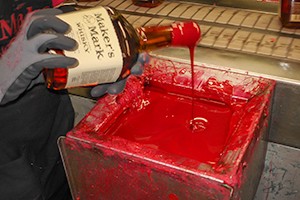Stories
Whisky is a passion to explore. From the history of the spirit to the evolution of the industry, the story of whisky helps fuel that passion. Often, it’s easy to forget that whisky is also a global multibillion dollar industry. The stories of whisky — from news and new releases to in-depth inquires and what goes on behind the label — blend together to help us appreciate the spirit of whisky.

Ruling Expected Soon on Motion to Dismiss Maker’s Mark Lawsuit
 March 2, 2015 – A hearing originally scheduled for today in the proposed class-action lawsuit against Maker’s Mark has been cancelled. U.S. District Court Judge John Houston issued an order canceling the hearing on a motion by attorneys for Maker’s Mark to dismiss the lawsuit accusing the Bourbon brand of misleading California consumers with claims that it is “hand-made” at the Maker’s Mark Distillery in Loretto, Kentucky. Judge Houston’s order states that the court has enough information from both sides to issue his ruling on the order without oral arguments, with a ruling expected “in due course.”
March 2, 2015 – A hearing originally scheduled for today in the proposed class-action lawsuit against Maker’s Mark has been cancelled. U.S. District Court Judge John Houston issued an order canceling the hearing on a motion by attorneys for Maker’s Mark to dismiss the lawsuit accusing the Bourbon brand of misleading California consumers with claims that it is “hand-made” at the Maker’s Mark Distillery in Loretto, Kentucky. Judge Houston’s order states that the court has enough information from both sides to issue his ruling on the order without oral arguments, with a ruling expected “in due course.”
The lawsuit was filed in December by lawyers representing plaintiffs Safora Nowruzi and Travis Williams, with a request to expand the plaintiff class to include all California residents who purchased Maker’s Mark within the past four years. The suit claims that Maker’s Mark labeling violates California’s false advertising and consumer protection laws by billing the Bourbon as “hand-made,” when it comes from a distillery using extensive amounts of machinery. The lawsuit seeks at least $5 million in damages, along with punitive damages and attorneys’ fees.
In its motion to dismiss the lawsuit filed January 16, attorneys for Maker’s Mark and brand owner Beam Suntory argued that the complaint falls within California’s “safe harbor” doctrine protecting businesses from claims, since all of the brand’s labels with the “hand-made” language have been reviewed and approved by the US Treasury Department’s Tax & Trade Bureau. In addition, the motion argued that a reasonable consumer would not be misled by the labeling.
“The reasonable consumer analysis starts, of course, with common sense. And common sense dictates that “handmade” bourbon does not mean, as Plaintiffs would have it, that every step of the process—from grinding the grain to affixing the label on the bottle—was done by hand and without the use of any machinery. Moreover, as evident from Plaintiffs’ own allegations and information referenced in their Complaint, the Maker’s Mark label could not have misled a reasonable consumer to believe that the entire process for making the bourbon was done by hand, because Maker’s Mark publicly discloses its process for making bourbon. Indeed, as Plaintiffs allege in their Complaint, Maker’s Mark’s public website contains detailed information about the production process. What’s more, the Maker’s Mark label expressly invites consumers to visit its website and contains the website address. Given these facts, a reasonable consumer could not plausibly believe that the bourbon is literally made entirely by hand and without the use of any machinery.”
In their response, attorneys Abbas Kazerouni, Mona Amini, and Joshua Swigart argued that the “safe harbor” defense does not apply in this case, since it is intended to cover laws and regulations, not agency actions such as a TTB label approval process.
“It would contravene public policy and reason in general to immunize an alcohol manufacturer from consumer fraud suits because the labels of its products had been approved by the TTB. Unlike, for example, the FDA’s “rigorous” pre-approval process for drugs, the TTB’s approval of alcohol labels hinges on self-reporting. 2 Thus, the TTB’s approval of Defendant’s label demonstrates nothing more than that Defendant repeatedly affirmed to the TTB that its product is truly handmade. It does not suggest that if the TTB had known the true process by which Maker’s Mark was actually made, it would have concluded that Defendant’s label complied with federal law.”
The two firms have also filed a similar lawsuit against Beam Suntory’s Jim Beam brand based on similar claims. Beam Suntory spokesmen have declined to comment on either case, citing a company policy against commenting on pending litigation.
Editor’s note: We have provided links in this story to the actual court filings in the lawsuit. Note that in civil cases, the arguments made by either side are not considered to be proven as fact until argued in open court.
Links: Maker’s Mark | Kazerouni Law Group



